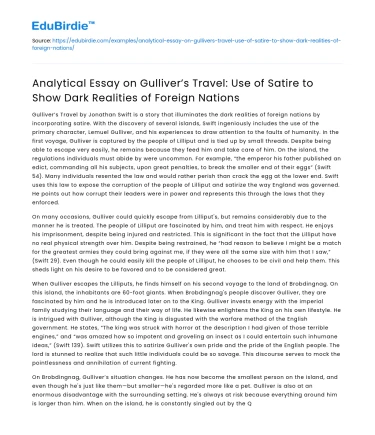Gulliver’s Travel by Jonathan Swift is a story that illuminates the dark realities of foreign nations by incorporating satire. With the discovery of several islands, Swift ingeniously includes the use of the primary character, Lemuel Gulliver, and his experiences to draw attention to the faults of humanity. In the first voyage, Gulliver is captured by the people of Lilliput and is tied up by small threads. Despite being able to escape very easily, he remains because they feed him and take care of him. On the island, the regulations individuals must abide by were uncommon. For example, “the emperor his father published an edict, commanding all his subjects, upon great penalties, to break the smaller end of their eggs” (Swift 54). Many individuals resented the law and would rather perish than crack the egg at the lower end. Swift uses this law to expose the corruption of the people of Lilliput and satirize the way England was governed. He points out how corrupt their leaders were in power and represents this through the laws that they enforced.
On many occasions, Gulliver could quickly escape from Lilliput's, but remains considerably due to the manner he is treated. The people of Lilliput are fascinated by him, and treat him with respect. He enjoys his imprisonment, despite being injured and restricted. This is significant in the fact that the Lilliput have no real physical strength over him. Despite being restrained, he “had reason to believe I might be a match for the greatest armies they could bring against me, if they were all the same size with him that I saw,” (Swift 29). Even though he could easily kill the people of Lilliput, he chooses to be civil and help them. This sheds light on his desire to be favored and to be considered great.
Save your time!
We can take care of your essay
- Proper editing and formatting
- Free revision, title page, and bibliography
- Flexible prices and money-back guarantee
When Gulliver escapes the Lilliputs, he finds himself on his second voyage to the land of Brobdingnag. On this island, the inhabitants are 60-foot giants. When Brobdingnag's people discover Gulliver, they are fascinated by him and he is introduced later on to the King. Gulliver invests energy with the imperial family studying their language and their way of life. He likewise enlightens the King on his own lifestyle. He is intrigued with Gulliver, although the King is disgusted with the warfare method of the English government. He states, “The king was struck with horror at the description I had given of those terrible engines,” and “was amazed how so impotent and groveling an insect as I could entertain such inhumane ideas,” (Swift 139). Swift utilizes this to satirize Gulliver's own pride and the pride of the English people. The lord is stunned to realize that such little individuals could be so savage. This discourse serves to mock the pointlessness and annihilation of current fighting.
On Brobdingnag, Gulliver’s situation changes. He has now become the smallest person on the island, and even though he's just like them—but smaller—he's regarded more like a pet. Gulliver is also at an enormous disadvantage with the surrounding setting. He's always at risk because everything around him is larger than him. When on the island, he is constantly singled out by the Queen’s dwarf, who enjoys torturing him. On one record, the dwarf “took me up by the middle, as I was sitting down, not thinking any harm, and let me drop into a large silver bowl of cream,” (Swift 113). In this model, Quick is despising the propensity for singling out somebody littler than themselves. This is noteworthy in light of the fact that contrasted with different Brobdingnags, he has always been unable to state control over other individuals.
The third trip of Gulliver brings him to Laputa, an island floating in the sky. Gulliver is directed to the Laputian ruler, who is excessively caught up with taking care of a math issue to see Gulliver for the primary hour. Until a flapper nudges him, which is a creature that alerts him when required, the king does not acknowledge him. Gulliver makes the accusation that “It seems the minds of these people are so taken up with intense speculations, that they neither can speak, nor attend to the discourse of others, without being roused by some external taction,” (Swift 162). Swift criticizes the areas of science and mathematics for disregarding other individuals and not concentrating on other stuff in life. The Laputans are so made up for lost time in issues to fix, they can't perceive the things around them.
Regardless of the way that Gulliver has been harmed on each voyage, it is noteworthy that he goes once more. When he arrives home, he is invited on another voyage by Captain William Robinson, who is the commander of Hopewell. He is requested on the ship to be a surgeon, and accepts the invitation. Gulliver states, “I could not reject his proposal; the thirst I had of seeing the world, notwithstanding my past misfortunes, continuing as violent as ever.” (Swift 157). This uncovers that although he has had detriments on the past setbacks, he doesn't consider them to be horrendous. It is significant that he will hazard his life for the joy of seeing the world.
On the fourth and last voyage, Gulliver leaves on another experience as a ship's captain.






 Stuck on your essay?
Stuck on your essay?

